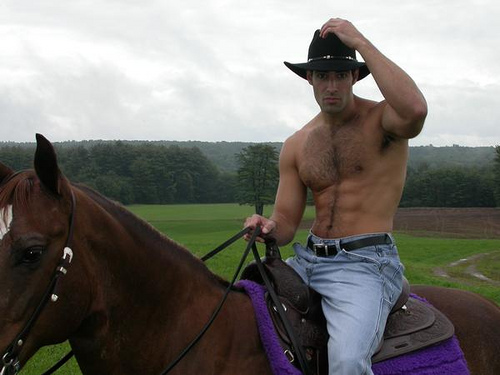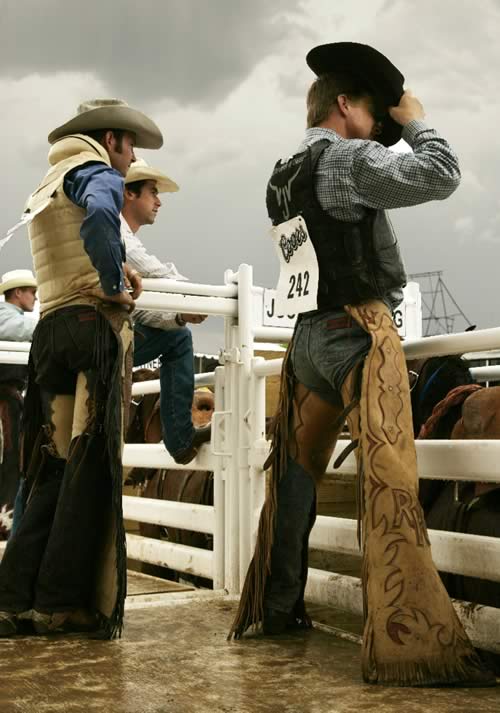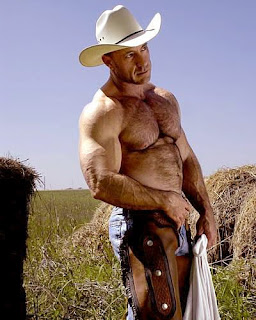As the ever-practical cowboy adapted to the modern world, the cowboy's equipment and techniques also adapted to some degree, though many classic traditions are still preserved today.
As the frontier ended, the cowboy life came to be highly romanticized. Exhibitions such as those of Buffalo Bill Cody's Wild West Show helped to popularize the image of the cowboy as an idealized representative of the tradition of chivalry.
 In today's society, there is little understanding of the daily realities of actual agricultural life. Cowboys are more often associated with (mostly fictitious) Indian-fighting than with their actual life of ranch work and cattle-tending. Actors such as John Wayne are thought of as exemplifying a cowboy ideal, even though western movies seldom bear much resemblance to real cowboy life. Arguably, the modern rodeo competitor is much closer to being an actual cowboy, as many were actually raised on ranches and around livestock, and the rest have needed to learn livestock-handling skills on the job.
In today's society, there is little understanding of the daily realities of actual agricultural life. Cowboys are more often associated with (mostly fictitious) Indian-fighting than with their actual life of ranch work and cattle-tending. Actors such as John Wayne are thought of as exemplifying a cowboy ideal, even though western movies seldom bear much resemblance to real cowboy life. Arguably, the modern rodeo competitor is much closer to being an actual cowboy, as many were actually raised on ranches and around livestock, and the rest have needed to learn livestock-handling skills on the job.
However, in the United States and the Canadian West, as well as Australia, guest ranches offer people the opportunity to ride horses and get a taste of the western life—albeit in far greater comfort. Some ranches also offer vacationers the opportunity to actually perform cowboy tasks by participating in cattle drives or accompanying wagon trains. This type of vacation was popularized by the 1991 movie City Slickers, starring Billy Crystal.
The cowboy is also portrayed as a masculine ideal via images ranging from the Marlboro Man to the Village People.
Symbolism
The long history of the West in popular culture tends to define those clothed in Western clothing as cowboys or cowgirls whether they have ever been on a horse or not. This is especially true when applied to entertainers and those in the public arena who wear western wear as part of their persona.
However, many people, particularly in the West, wear elements of Western clothing, particularly cowboy boots or hats, as a matter of form even though they have other jobs, up to and including lawyers, bankers, and other white collar professionals. Conversely, some people raised on ranches do not necessarily define themselves cowboys or cowgirls unless they feel their primary job is to work with livestock or if they compete in rodeos.
Actual cowboys in general tend to value personal honesty and have derisive expressions for individuals who adopt cowboy mannerisms as a fashion pose without any actual understanding of the culture. For example, a "drugstore cowboy" means someone who wears the clothing but cannot actually ride anything but the stool of the drugstore soda fountain--or, in modern times, a bar stool. The phrase, "all hat and no cattle," is used to describe someone (usually male) who boasts about himself, far in excess of any actual accomplishments. The word "dude" (or the now-archaic term "greenhorn") indicates an individual unfamiliar with cowboy culture, especially one who is trying to pretend otherwise.
Outside of the United States, the cowboy became an archetypal symbol of American individualism. In the late 1950s, a Congolese youth subculture calling themselves the Bills based their style and outlook on Hollywood's depiction of cowboys in movies. Something similar occurred with the term "Apache," which in early twentieth century Parisian society was a slang term for an outlaw.




